A State of Mind (2004)
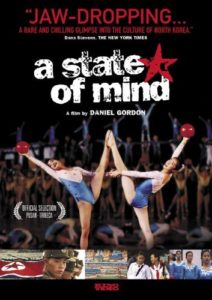 By Daniel Gordon. 1 h 33 min. Trailer.
By Daniel Gordon. 1 h 33 min. Trailer.
Keywords: nationalism, authoritarianism, sports, the body, habitus, North Korea
The movie follows two North Korean schoolgirls and their families in the lead up to the “Mass Games” … and in the process reveals more of North Korea than ever before. … VeryMuchSo productions was granted permission from the North Korean film authorities to make a second documentary: an observational film following two young gymnasts, 13-year-old Pak Hyon Sun and 11-year-old Kim Song Yun, and their families for over eight months in the lead up to the Mass Games involving a cast of thousands in a choreographed socialist realism spectacular the biggest and most elaborate human performance on earth. [Synopsis from Kanopy]
Bethel: Community and Schizophrenia in Northern Japan (2007)
 By Karen Nakamura. 40 min. Trailer.
By Karen Nakamura. 40 min. Trailer.
Keywords: mental illness and health, stigma, resilience, interaction ritual, disability studies, Japan
Located in a small fishing town on the northern island of Hokkaido in Japan is a small but vibrant group of people with schizophrenia and other psychosocial disabilities. Bethel House was founded in 1984 to support people with these types of disabilities living in the community. The film explores how the members of Bethel struggle with their lives, their problems, and the meaning of community. [Synopsis from IMDb]
Dear Pyongyang (2005)
 By Yang Young-hee. 107 min. Trailer.
By Yang Young-hee. 107 min. Trailer.
Keywords: family, love, post-colonialism, diaspora, long-distance nationalism, Korea, Japan
A young girl’s father sends her three brothers from Japan to live permanently in a homeland foreign to them—North Korea. In this autobiographical documentary spanning ten years, the daughter who was left behind—filmmaker Yonghi Yang—struggles to understand why her loving father would destroy his family out of political loyalty to an isolated and enigmatic regime. [Synopsis from Kanopy]
Hafu: The Mixed-Race Experience in Japan (2013)
 By Megumi Nishikura, Lara Perez Takagi. 1h 30 min. Trailer.
By Megumi Nishikura, Lara Perez Takagi. 1h 30 min. Trailer.
Keywords: mixed race, globalization, multiculturalism, discrimination, Ghana, Zainichi, Venezuela, Mexico, Australia
A journey into the intricacies of mixed-race Japanese and their multicultural experiences in modern day Japan. For some hafus, Japan is the only home they know, for some living in Japan is an entirely new experience, and the others are caught somewhere between two different worlds. [Synopsis from IMDb]
In the Matter of Cha Jung Hee (2010)
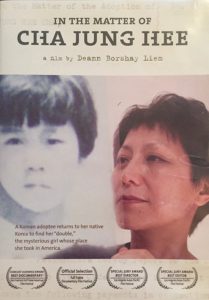 By Deann Borshay Liem. 1 h. Trailer.
By Deann Borshay Liem. 1 h. Trailer.
Keywords: transnational adoption, identity, kinship, return, roots, U.S., South Korea
Her passport said she was Cha Jung Hee. She knew she was not. So began a 40-year deception for a Korean adoptee who came to the United States in 1966. Told to keep her true identity secret from her new American family, the 8-year-old girl quickly forgot she had ever been anyone else. But why had her identity been switched? And who was the real Cha Jung Hee? [Synopsis from PBS]
Last Train Home (2009)
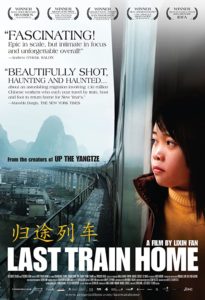 By Lixin Fan. 1 h 25 min. Trailer.
By Lixin Fan. 1 h 25 min. Trailer.
Keywords: labor migration, urbanization, class, family, China
A couple embarks on a journey home for Chinese new year along with 130 million other migrant workers, to reunite with their children and struggle for a future. Their unseen story plays out as China soars towards being a world superpower. [Synopsis from IMDb]
Mardi Gras: Made in China (2005)
 By David Redmon. 1 h 12 min. Trailer.
By David Redmon. 1 h 12 min. Trailer.
Keywords: globalization, commodity chain, labor, capitalism, alienation
Mardi Gras: Made in China follows the path of Mardi Gras beads from the streets of New Orleans during Carnival – where revelers party and exchange beads for nudity – to the disciplined factories in Fuzhou, China – where teenage girls live and sew beads together all day and night. Blending curiosity with comedy, Mardi Gras: Made in China is the only film to explore how the toxic products directly affect the people who both make and consume them. [Synopsis from Kanopy]
Morning Sun (2003)
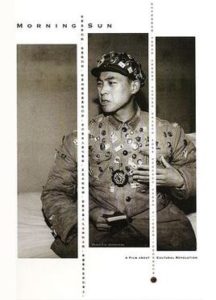 By Carma Hinton and Richard Gordon. 1 h 57 min. Trailer.
By Carma Hinton and Richard Gordon. 1 h 57 min. Trailer.
The film Morning Sun attempts in the space of a two-hour documentary film to create an inner history of the Great Proletarian Cultural Revolution (c.1964-1976). It provides a multi-perspective view of a tumultuous period as seen through the eyes—and reflected in the hearts and minds—of members of the high-school generation that was born around the time of the founding of the People’s Republic of China in 1949, and that came of age in the 1960s. Others join them in creating in the film’s conversation about the period and the psycho-emotional topography of high-Maoist China, as well as the enduring legacy of that period.
[Synopsis from the Official Website]
One Child Nation (2019)
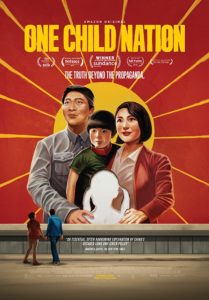 By Nanfu Wang. 1 h 27 min. Trailer.
By Nanfu Wang. 1 h 27 min. Trailer.
Keywords: one-child policy, gender, family, abortion, sterilization, biopolitics, China
China’s One Child Policy, the extreme population control measure that made it illegal for couples to have more than one child, may have ended in 2015, but the process of dealing with the trauma of its brutal enforcement is only just beginning… Wang digs fearlessly into her own personal life, weaving her experience as a new mother and the firsthand accounts of her family members into archival propaganda material and testimony from victims and perpetrators alike, yielding a revelatory and essential record of this chilling, unprecedented moment in human civilization. [Synopsis from the Official Website]
Planet of Snail (2011)
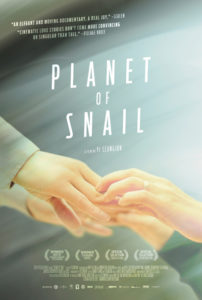 By Seung-jun Yi. 1 h 28 min. Trailer.
By Seung-jun Yi. 1 h 28 min. Trailer.
Keywords: touch, sense, marriage, love, art, disability studies, South Korea
An acclaimed documentary following the journey of a most extraordinary couple. Young-Chan is an accomplished poet who can no longer hear or see. He communicates with his wife Soon-Ho through finger braille, a unique form of communication where words are tapped on each other’s hands. Combining breathtaking imagery with Young-Chan’s personal writings, PLANET OF SNAIL becomes a transfixing portrait of life on what seems like another planet, where touch communicates everything and love conquers all. [Synopsis from Kanopy]
Queer Japan (2019)
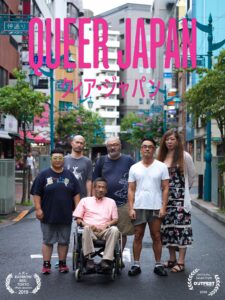 By Graham Kolbeins. 1h 38 min. Trailer.
By Graham Kolbeins. 1h 38 min. Trailer.
Trailblazing artists, activists, and everyday people from across the spectrum of gender and sexuality defy social norms and dare to live unconventional lives in this kaleidoscopic view of LGBTQ+ culture in contemporary Japan. From shiny pride parades to playfully perverse underground parties, Queer Japan pictures people living brazenly unconventional lives in the sunlight, the shadows, and everywhere in between. Dazzling, iconoclastic drag queen Vivienne Sato peels back the layers of language and identity. Maverick manga artist Gengoroh Tagame tours the world with his unapologetically erotic gay comics. Councilwoman Aya Kamikawa recounts her rocky path to becoming the first transgender elected official in Japan. At legendary kink-positive hentai party Department H, non-binary performance artist Saeborg uses rubber to create a second skin. Culled from 100+ interviews conducted over 3 years in locations across Japan, Queer Japan features dozens of individuals sharing their experiences in their own words. [Synopsis from IMDb]
Shinjuku Boys (1995)
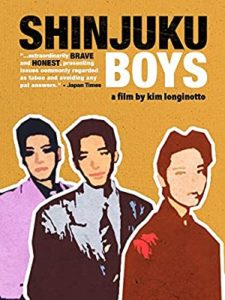
By Kim Longinotto. 53 min. Trailer.
Keywords: queer, host club, nightlife, transgender, sexuality, love, Tokyo
This film introduces three onnabes who work as hosts at the New Marilyn Club in Tokyo. Onnabes are women who live as men and have girlfriends, although they don’t usually identify as lesbians. As the film follows them at home and on the job, all three talk frankly to the camera about their gender-bending lives, revealing their views about women, sex, transvestitism and lesbianism. [Synopsis from Kanopy]
Shusenjo: The Main Battleground of the Comfort Women Issue (2018)
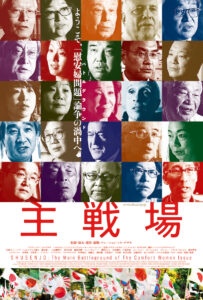 By Miki Dezaki. 2h. Trailer.
By Miki Dezaki. 2h. Trailer.
The “comfort women” issue is perhaps Japan’s most contentious present-day diplomatic quandary. Inside Japan, the issue is dividing the country across clear ideological lines. Supporters and detractors of “comfort women” are caught in a relentless battle over empirical evidence, the validity of oral testimony, the number of victims, the meaning of sexual slavery, and the definition of coercive recruitment. Credibility, legitimacy and influence serve as the rallying cry for all those involved in the battle. In addition, this largely domestic battleground has been shifted to the international arena, commanding the participation of various state and non-state actors and institutions from all over the world. This film delves deep into the most contentious debates and uncovers the hidden intentions of the supporters and detractors of comfort women. Most importantly it finds answers to some of the biggest questions for Japanese and Koreans: Were comfort women prostitutes or sex slaves? Were they coercively recruited? And, does Japan have a legal responsibility to apologize to the former comfort women? [Synopsis from the Official Website]
Still Tomorrow (2016)
 By Jian Fan. 1h 33 min. Trailer.
By Jian Fan. 1h 33 min. Trailer.
Keywords: art, resilience, gender, marriage, divorce, disability studies, China
A village woman, despite not having finished her high school education, has become China’s most famous poet. Her book of poetry has become the best-selling poetry book in China for the past 20 years. Still Tomorrow follows the poet, Yu Xihua, a 39-year-old woman living with cerebral palsy, and her sudden fame, poignantly weaving her personal narrative with that of an ascendant, urbanizing China. [Synopsis from PBS]
The Departure (2017)
 By Lana Wilson. 1 h 27 min. Trailer.
By Lana Wilson. 1 h 27 min. Trailer.
Keywords: suicide, loneliness, activism, Buddhism, Japan
Ittetsu Nemoto, a former punk-turned-Buddhist-priest in Japan, has made a career out of helping suicidal people find reasons to live. But this work has come increasingly at the cost of his own family and health, as he refuses to draw lines between his patients and himself. The Departure captures Nemoto at a crossroads, when his growing self-destructive tendencies lead him to confront the same question his patients ask him: what makes life worth living? [Synopsis from the official website]
Under the Sun (2015)
 By Vitaliy Manskiy. 1 h 46 min. Trailer.
By Vitaliy Manskiy. 1 h 46 min. Trailer.
Keywords: nationalism, authoritarianism, state rituals, family, coming-of-age, imagined community, North Korea
Although the film starts off as a propaganda movie, it disrupts the uniform narrative the North Korean officials tries to impose on the foreign crew when the director keeps the camera going between scripted scenes. Through the central figure—a little school-aged girl who lives with her parents—the film illuminates with lucid beauty and psychic depth what it is like to come of age under an authoritarian regime.
Up the Yangtze (2007)
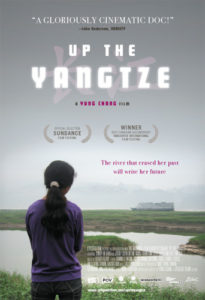 By Yung Chang. 1 h 33 min. Trailer.
By Yung Chang. 1 h 33 min. Trailer.
Keywords: environment, displacement, inequality, tourism, China
In China, it is simply known as “The River.” But the Yangtze—and all of the life that surrounds it—is undergoing a truly astonishing transformation wrought by the largest hydroelectric project in history, the Three Gorges Dam. Canadian documentary filmmaker Yung Chang returns to the gorgeous, now-disappearing landscape of his grandfather’s youth to trace the surreal life of a “farewell cruise” that traverses the gargantuan waterway. Singularly moving and cinematically breathtaking, UP THE YANGTZE gives a human dimension to the wrenching changes facing not only an increasingly globalized China, but the world at large. [Synopsis from Kanopy]